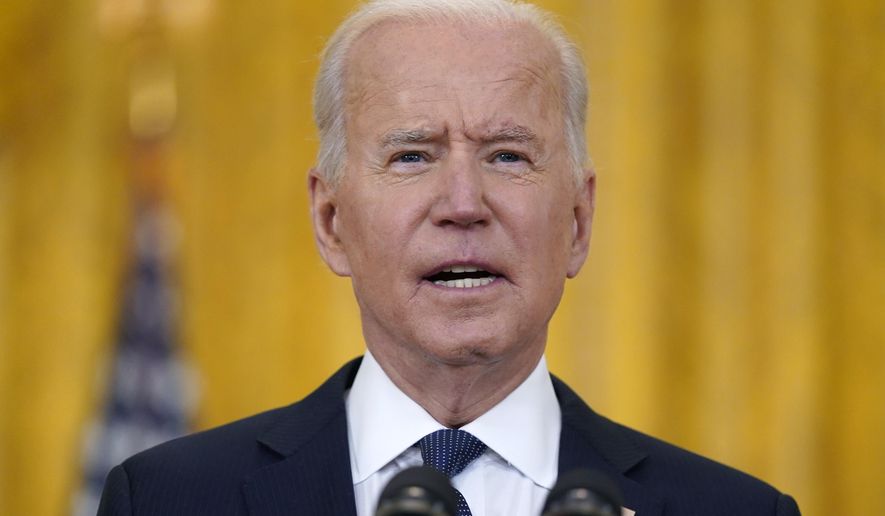Senate Republicans said they are willing to spend more on President Biden’s infrastructure plan than they initially suggested, ahead of a bipartisan White House meeting on the proposal this week.
“The proper price tag for what most of us think of as infrastructure is about $600-to-800 billion,” said Senate Minority Leader Mitch McConnell, Kentucky Republican.
Mr. McConnell’s $800 billion figure is significantly larger than the number Senate Republicans initially floated.
GOP lawmakers last month introduced their “fiscally responsible” infrastructure proposal, calling for spending $568 billion on rebuilding only the nation’s roads and bridges.
Sen. Shelley Moore Capito, West Virginia Republican, crafted the proposal to serve as a counterweight to Mr. Biden’s program, which is heavy on “human” infrastructure.
“This is a robust package when we look at where we’re focusing our infrastructure needs,” Mrs. Capito said.
The White House is proposing to spend $612 billion of its $2.25 trillion infrastructure package on transportation. Most of the spending offered by Mr. Biden would go to social welfare programs and climate change activism.
For instance, the administration’s plan includes more money for installing electric vehicle charging stations across the country than it does for upgrading airports, $174 billion compared to $25 billion.
Republicans argue that a national infrastructure package should stay true to the definition of the word and focus on roads, bridges and other transportation systems.
“What we’ve got here is what can best be described as a bait and switch,” Mr. McConnell said when discussing Mr. Biden’s proposal.
Despite the difference as to what constitutes infrastructure, Senate Republicans appear eager to negotiate.
Mr. McConnell’s decision to up the price tag of what is considered acceptable comes as Mrs. Capito is set to lead a delegation of Republicans to meet with the president later this week to discuss infrastructure.
A source close to the Senate GOP said the delegation would argue a compromise on spending could be met, provided the money went to “actual infrastructure and was paid for” appropriately.
The GOP’s give-and-take attitude results from concerns that Democrats may opt to move the package unilaterally via the budget reconciliation process.
Both parties hold 50 seats in the Senate, with Democrats maintaining the majority because of Vice President Kamala Harris’ tie-breaking vote.
That reality makes it difficult to pass significant legislation given the filibuster, a legislative rule requiring 60 votes to end debate and vote on a bill. Reconciliation, however, allows legislation dealing with spending and debt to pass via a simple majority of the chamber, usually 51 votes.
Senate Budget Committee Chairman Bernard Sanders showed Democrats’ willingness to cut out Republicans this weekend.
“If Republicans want to come on board, seriously, great,” said Mr. Sanders, a self-described democratic socialist from Vermont, when discussing infrastructure with Axios on HBO. “If not, we’re going to do it alone.”
Democrats, though, are holding out hope that reconciliation will not be required, especially in light of Mr. McConnell’s recent comments.
“Well, [Republicans are] moving our way, that’s encouraging,” said Senate Majority Whip Richard J. Durbin, Illinois Democrat. “I think it’s time to get this done.”
Still, many on Capitol Hill believe the two sides are far apart on how to fund the package.
The White House is actively pushing to pay for any new infrastructure spending through tax increases.
Mr. Biden, in particular, wants to repeal former President Donald Trump’s signature tax legislation from 2017. The move would not only raise the corporate tax rate, but also income taxes on the wealthy.
Republicans and some moderates have balked at the idea, arguing it would hurt an economy already struggling from the coronavirus pandemic. A number of lawmakers have proposed paying for the package through user fees, including raising the federal gasoline tax.
The White House says it is unwilling to rely on user fees for its proposal, however.
“Those are not areas where [the president] is going to move,” said White House press secretary Jen Psaki.
• Haris Alic can be reached at halic@washingtontimes.com.




Please read our comment policy before commenting.